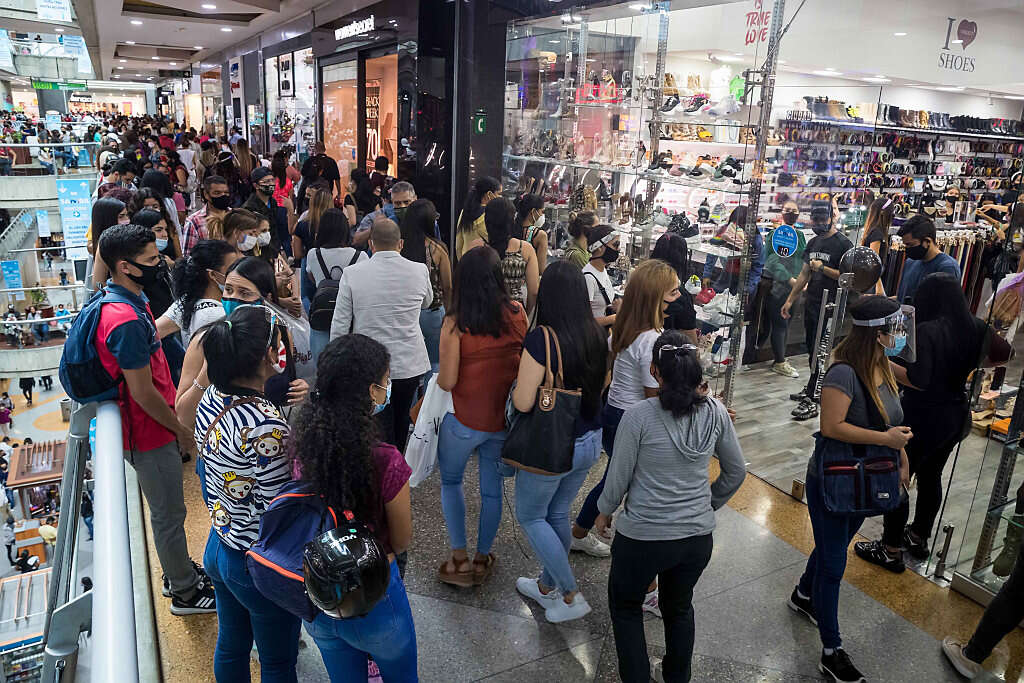"It's a good thing I kept working during the coronavirus [outbreak] because I shop even when I can't afford it," says Gali, 32, a self-confessed shopaholic from northern Israel.
"Everyone is on social media all the time, but I don't have time for that because I'm going through apps and purchasing groups for what I can buy and where things are the cheapest. All of my free time is focused on that, it's my only interest."
Gali is hardly alone. While most of us will not hesitate to give our credit cards a good workout for special sales like Black Friday or Cyber Monday, websites deliver tempting offers on a daily basis, and that's before we consider websites where items are cheaper in the first place. Clicking on "add to cart" and "place your order" has never been easier.
Follow Israel Hayom on Facebook and Twitter
Compulsive buying disorder (CBD), is not something that makes headlines in Israel, where turbulent politics, security threats, and now the global pandemic dominate the headlines.
CBD, more commonly known as shopping addiction, can lead to debt and hoarding. It is characterized by excessive shopping cognitions and buying behavior that leads to distress or impairment. Found worldwide, the disorder affects about 6% of Israelis, but experts believe the majority of cases go undiagnosed.
Still, there is no doubt that the coronavirus outbreak and the lockdowns that have seen online shopping boom like never before have exacerbated the problem.
A vicious circle
We're all familiar with the process: You go on a website to buy "just one thing you really need" but very quickly you get sucked into everything else it has to offer. The availability, convenience, and checkout speed, which almost always makes you oblivious to the actual amount of money you spent, creates the same effect as pulling out a credit card, by which if you don't see the actual money you spend, it's easier to spend it.
This feeling only intensifies if you happen to be using a website that stores your credit card information, as simply clicking "Pay" saves you precious time. Add to that the satisfaction you feel when you add one more $25 item and hit the minimum order to qualify for free shipping, and you'll find that little compares to the rush the online shopping experience provides. Sound familiar?

"Shopping addiction is not a defined as a psychiatric diagnosis but it is recognized as an impulse control disorder," Dr. Shira Sobol, a behavioral disorders and addiction specialist who serves as a senior lecturer at Bar Ilan University, explains.
"I see more and more people who speak of very high expenses, of living beyond their means, having credit cards that the rest of the family doesn't know about, using funds from their private business and more."
Q: What drives the compulsion to constantly shop?
"As with any addiction, here, too, it is just a symptom. The need for escapism, dealing with feelings of emptiness, compensation for what one perceives as a shortcoming and sometimes trying to get positive reinforcements through shopping are the the heart of it, but the problem is that it doesn't really bring happiness or fill the mental void.
"Instead, it causes guilt. It's a vicious circle that expands over the years. You shop to feel good but you feel bad because of the money you spend on things you don't need, so you shop again, to calm those emotions, and so on."
Q: How can you tell the difference between just another shopping spree and shopping addiction?
"There's nothing wrong with occasionally indulging in a garment or a product. The problem begins when it becomes a coping mechanism meant to try to resolve mental conflict. If this is your routine compensation; if you devote time to it at the expense of work or time with your family; take out loans or get into debt to finance your shopping – it's an addiction. "
Q: Has the pandemic caused routine shopping to escalate into an addiction?
According to Sobol, such extreme circumstances can trigger addictions of all kinds, including CBD.
"The lockdown, the endless sitting in front of screens along with the lack of other forms of gratification, like flying abroad or visiting stores, exacerbated the tendency to buy online.
"The coronavirus has also aggravated mental conditions. If someone was anxious or lonely, they are more anxious or lonley now and when there's a deterioration in one's emotional state addictive behaviors rear their heads because they can regulate these feelings," she explained.
"Online shopping is a way to assert ownership of the freedom taken from us, and it makes up feel as if there are some areas of our lives we can still control. But this is just an illusion of control, as eventually, addiction isn't will hold you in a vise."
The thrill of the unknown
"I buy a lot of things I don't need," Gali admitted to Israel Hayom. "Clothes, bags. I have no place to put all of the shoes I bought during the corona [lockdowns]. I would love to get rid of some of this stuff."
Q: How do you manage to pay for all this shopping?
"I live with my parents and luckily, I'm employed. I was considered a spendthrift even before online shopping came along, and I would shop even when I couldn't afford it. Today I make sure not to get into debt but I also can't save any money and that bothers me."
Q: What's so appealing about shopping online?
"It's just so easy. My credit card [information] is stored and it's easy to use. I don't try on the clothes so it's a risk and that represents a thrill. But the biggest rush is when the package arrives. That's the real high. From there, it's all a letdown. I open it and I see what I bought and I say, 'Okay, I have a million of these. Why did I need it?'"
Q: How much do you spend in a single month?
"Between 4,000 and 5,000 shekels [$1,200-$1,500] a month. In the past, I got into debt and had to take loans. I was NIS 100,000 [$30,250] in debt and creditors were breathing down my neck. I pulled myself together because I had to. It took a few years for me to get out of debt. I've only has a credit card for three years but they [the credit card company] recently offered me another one, so I said yes."
No escaping 'special offers'
Even if you manage to somehow resist online shopping website, fear not for social media is here to "help." Facebook and Instagram are brimming with consumer and purchasing groups that have one goal in mind: helping you find the best bargains and the cheapest items – that you will then share online.
These groups are, of course, only a tiny fraction of what the internet has to offer but they only add to the sensory overload under the guise of trying to save users time.
Surprisingly, the shopaholics we spoke to are brutally honest about their experiences and it seems they see sharing them as therapeutic.

N., 42, subscribes to one of the leading purchasing groups on Facebook.
"They took away traveling so I found myself focused on online shopping," she said, referring to the travel restrictions imposed by the government as part of the effort to curb the spread of the coronavirus.
"I buy a lot of things I don't need. Expansive boots I have no use for, a fridge I didn't need and bought just because it was on sale. This month's credit card bill was almost NIS 20,000 [$6,000]."
Q: Why go on these websites? To shop or because you're bored?
"Sometimes to buy something I need and sometimes just to browse. Before the pandemic, I relaxed a bit with the shopping, but it brought me back to the edge."
Q: Would you like to stop?
"Absolutely, yes. But my screen time just increases, mostly at the expense of time with my family. It's a feeling of compensation for things I don't do. Without cafés, restaurants, vacations, what do we have left?"
Shopping addiction is not prevalent across all socioeconomic echelons, but it is becoming more common and with it is the awareness of it.
Sobol noted that according to studies on the issue, women are more vulnerable to shopping addiction than men, which links back to the fact that modern culture places more of an emphasis on the appearance of women than men.
"There are not enough studies on shopping addictions," she explains, "but about 6% of the population suffers from it, and it is estimated that only about 20% of the cases are diagnosed this condition is considered legitimate in our high-consumption society," expert says.
"The majority [of shopaholics] are women. We also see more women than men, especially in their late 20s to 30s, in our clinic. Many of these women suffer from anxiety disorders, depression and low self-esteem."
Twenty-six-year-old Karin Almakis has no problem coming forward as a shopaholic, nor does she mind admitting that most of what she buys is of little use to her.
"I get everything from Ali Express – everything," she says, naming the Chinese retail giant. "There must be 50 items on their way to me right now."
Q: There will be those who will say that your time is more valuable than what you buy.
"Now I'm self-employed, but when I was a [salaried] employee it really infringed on my time at work. My boyfriend doesn't always like the I shop so much, especially since I have almost no room at home for anything I buy. So I show him only what I know he would want, and that causes some credibility issues in our relationship.
"I pay a price because I buy things I don't always need, but the price is small compared to the pleasure it gives me," she says.
Almakis may be aware of her addiction but according to Sobol, most are not.
"There's a lot of denial of this issue. Most of the time, addicts will seek treatment, if at all, only at later stages, when debts have accumulated.
"As long as it does not impair one's financial situation and interpersonal relationship, and does not manage the person it's fine, it's a nice hobby. But once it crosses the line, it becomes a problem, an addiction," she said.
Subscribe to Israel Hayom's daily newsletter and never miss our top stories!




